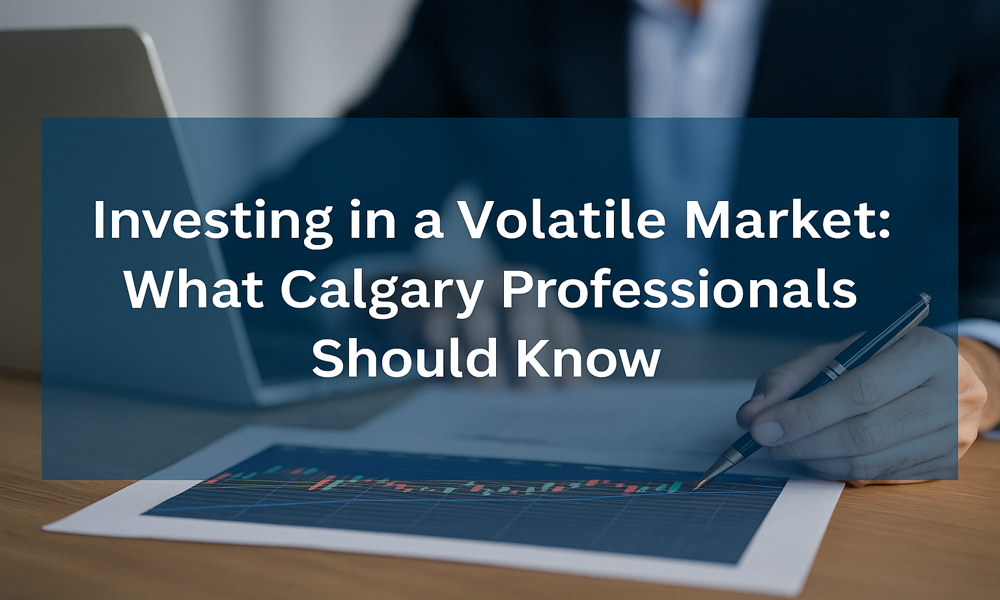Investing in a Volatile Market: What Calgary Professionals Should Know
Volatile markets are normal. Calgary investors can stay confident by using a structured wealth plan, staying diversified, and working with a financial advisor—not reacting emotionally.

Written by
Ryan Gubic
Published on
25
Jul 2025
Copy link
Investing in a Volatile Market: What Calgary Professionals Should Know
Investment market volatility can be unsettling—even for seasoned investors. Sudden swings, recession talk, and global uncertainty often lead to one of two reactions: panic selling or complete paralysis.
But investment volatility isn’t something to avoid—it’s something to prepare for and manage.
For Calgary professionals, business owners, and retirees, market swings are a fact of life. The key is to build a wealth management plan with your financial advisor in Calgary that works with volatility instead of reacting to it.
Here’s what you need to know to stay confident and strategic in uncertain investment markets.
1. Investment Market Volatility Is Normal—And Necessary
Despite what the headlines suggest, investment market volatility is not unusual. In fact:
- The S&P 500 has averaged large intra-year drops annually since 1980
- Most years still end positive
- Pullbacks create buying opportunities and rebalancing triggers
Investment market volatility reflects uncertainty and shifting investor expectations. But over time, the market rewards discipline and wealth management strategy, not timing.
2. Have a Written Investment Policy or Strategy
A written investment policy or wealth management strategy acts as your guardrail during investment market swings. It outlines:
- Your long-term goals
- Target investment asset allocation
- Risk tolerance and time horizon
- Rebalancing triggers
- Tax efficiency strategies
At MRG Wealth Management, our clients work with a financial advisor in Calgary that provides discretionary portfolio management, which means their portfolios are adjusted automatically based on their goals, risk tolerance, and market conditions—without emotional interference.
3. Don’t Try to Time the Stock Market
Trying to guess the top or bottom is a fool’s game. Even missing a handful of strong recovery days can drastically impact long-term returns.
Example:
- Missing the 10 best days in a 20-year period can cut your return by nearly 50%
Instead of chasing headlines:
- Stick to a consistent wealth management strategy
- Keep contributing to investment accounts during down markets
- Rebalance as opportunities arise
4. Rebalancing Is a Built-In Discipline Tool
When the investment markets drop, equities have historically declined faster than bonds or alternatives, which can throw your investment portfolio off balance.
A disciplined investment rebalancing approach:
- Buys low and sells high automatically
- Keeps your risk profile in check
- Avoids the temptation to overcorrect
Our clients’ investment portfolios are rebalanced when thresholds are breached—not on emotion, but on objective portfolio math.
5. Review Your Liquidity and Emergency Planning
Volatile periods are a great reminder to:
- Keep 3–6 months of expenses in a high-interest cash reserve
- Maintain access to low-risk investments for flexibility
- Avoid selling long-term holdings for short-term needs
If you’re retired, using a cash wedge or bucket strategy can help fund withdrawals without disrupting growth assets during downturns.
6. Stay Diversified—Especially Across Asset Classes
In turbulent markets, investment diversification works better than ever. Consider exposure to:
- Equities across Canada, U.S., and global markets
- Bonds of varying durations and credit quality
- Real assets like infrastructure and real estate
- Alternatives (private credit, private equity) for non-correlated returns
Diversification reduces the impact of any single event and can keep your portfolio resilient over time. Important to discuss your specific situation with a qualified financial advisor in Calgary.
7. Talk to Your Financial Advisor Before Making Big Changes
Emotional investment decisions during volatile periods often result in:
- Realizing losses unnecessarily
- Triggering taxes or penalties
- Locking in lower yields or returns
Instead, use investment volatility as a reason to:
- Review your wealth management plan
- Evaluate new opportunities (e.g., tax-loss harvesting, reallocation)
- Reaffirm your long-term goals
Invest with Confidence—Even in Uncertain Markets
At MRG Wealth Management, we help Calgary professionals, business owners, and retirees navigate volatility without fear. As your Personal CFO, we manage your investments with discipline, structure, and an integrated wealth management strategy—so you don’t have to guess what to do next.
Book a complimentary introduction call and learn how our institutional wealth management approach can help you stay on track, no matter what the market does.
Ryan Gubic is the founder of MRG Wealth Management Inc. operating as MRG Wealth (“MRG”) and is a Portfolio Manager with MRG investments of Aligned Capital Partners Inc. (“ACPI”). The opinions expressed are not necessarily those of MRG, ACPI, or Ryan Gubic. This material is provided for general information and the opinions expressed and information provided herein are subject to change without notice. Every effort has been made to compile this material from reliable sources however no warranty can be made as to its accuracy or completeness. Before acting on the information presented, seek professional financial advice based on your personal circumstances. ACPI is a full-service investment dealer and a member of the Canadian Investor Protection Fund (“CIPF”) and the Canadian Investment Regulatory Organization (“CIRO”). Investment services are provided through MRG Investments, an approved trade name of ACPI. Only investment-related products and services are offered through MRG Investments of ACPI and covered by the CIPF. Financial planning and insurance services are provided through MRG. MRG is an independent company separate and distinct from MRG Investments of ACPI.
Dollars and Sense
Discover more
Dive into some advice directly from our Founder and Personal CFO.

Annual Markets Review - 2025


